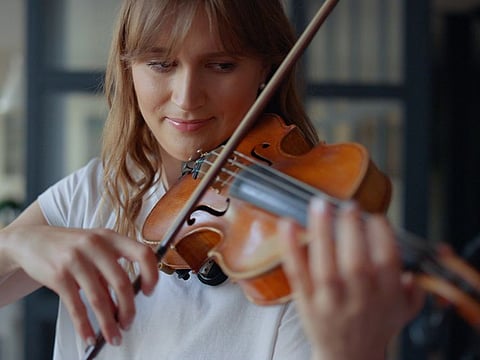Is it ever too late to learn a musical instrument? Why adults struggle and how to overcome
Many believe childhood is the prime time for learning an instrument

Playing the violin had never been easy, but she didn't remember it being this hard.
In childhood, Dubai-based Yashvi Dhanak had never missed a note on the violin. Instinctively, she knew how to wrap her fingers around the bow, with the index finger slightly arched. After returning to the violin after more than 22 years, she found herself struggling, as playing the violin requires a delicate balance of precise elbow and wrist positioning, all while supporting the instrument with just your chin, something that her childhood self knew well. Now, if even one aspect is off, the whole tune goes for a toss.
Dhanak shares her perplexed feelings. “I don’t think that I took so long to learn as a child. It all seemed so simple back then. Now as cathartic as the challenge is, it’s also quite an effort,” she says.
Similarly, Abu Dhabi-based Sukriti Mehta, a homemaker, who has taken to learning the piano, finds it a lot more challenging than she expected. “I suppose I lack patience sometimes. And unlike in childhood, I don’t have the luxury of dedicated practice time every day,” she says.
Both Dhanak and Mehta reluctantly agree: Learning an instrument was far easier as a child. There was more time, freedom, and well, cognitive energy to learn, too. Yet, that brings us to the question, was childhood truly the golden window for picking up an instrument? What about now?
An Abu Dhabi-based guitarist who prefers not to be named, has a rather different point of view. “I didn’t have the patience to learn as a child and couldn’t understand the nuances of any instrument. So, I would say that I’m much better now, because I keep trying something new every day, and I have the will to experiment, something that I didn’t have in childhood," he says.
Clearly, the experience varies. While many believe childhood is the prime time for learning an instrument, others argue that adulthood has its own set of advantages.
Why children excel at learning instruments
Alexandre Machado, a Dubai-based neuropsychiatrist, says that the difficulty of adults learning to play a musical instrument compared to children involves several cognitive aspects. “The main point is neuroplasticity, or the ability of our brain to adapt over time by creating new neural networks. Children, during their developmental phases, exhibit a high level of brain plasticity,” he says.
Their brains are constantly changing and are much more efficient at creating new neural networks. This characteristic makes the learning of complex skills, such as playing an instrument, much easier for them. “Children learn in a much more intuitive way, experimenting with sounds and rhythms without excessive concern about making mistakes or performance; they primarily focus on the pleasurable aspect of expressing themselves through music,” says Machado.
The main point is neuroplasticity, or the ability of our brain to adapt over time by creating new neural networks. Children, during their developmental phases, exhibit a high level of brain plasticity...

Satish Chandran, a neuropsychiatrist based in Dubai, explains that during childhood, the brain is rapidly developing, creating a network of connections that makes it highly adaptable. It helps children to easily acquire complex skills like playing an instrument. The motor cortex, responsible for fine motor skills, is still flexible, allowing children to develop precise hand movements needed for playing instruments. Their brain is also tuned to recognise musical patterns, making it easier to grasp rhythm and melody.
Children’s natural curiosity and willingness to experiment, without fear of failure, encourage their intuitive approach to learning. In contrast, adults tend to overanalyse and criticise themselves, which can hinder progress. Additionally, the brain's myelination process—insulating neural pathways—helps children learn faster by speeding up signal transmission, giving them an edge in acquiring new skills.
As a result, the combination of heightened neuroplasticity, active synaptogenesis, motor cortex flexibility, and intuitive learning strategies makes childhood an ideal period for acquiring complex skills such as playing a musical instrument. These physiological and cognitive advantages, paired with an unpressured approach to learning, set the stage for progress in early life.
However, as we move into adulthood, the cognitive flexibility that makes learning easier for children tends to decline, presenting a different set of obstacles for adults.
The adult perspective: Challenges and strengths
While adults might have life experiences and maturity, these strengths can paradoxically become obstacles when learning new skills like playing a musical instrument. According to Machado, adults tend to have a more consolidated but less flexible cognitive structure compared to children. This rigidity stems from the brain's reduced ability to adapt and form new connections as we age, making learning less efficient compared to childhood. Consequently, this affects our way of expressing ourselves musically. This cognitive inflexibility can make the learning process slower and more effort-intensive for adults.
Moreover, unlike children, who often experiment freely, as adults, we tend to approach learning with a critical and analytical mindset. This methodical approach, while beneficial for tasks requiring precision, can lead to excessive self-criticism. We are so keen on avoiding mistakes, and this determination creates a mental barrier to experimentation. The anxiety tends to be suffocating, and in the end, instead of feeling a sense of catharsis, we’re just far more stressed.
In this regard, Dubai-based Monica Mohan, a Dubai-based media professional and saxophonist, recalls how she has been in ‘tears’ during her practice sessions. “My teacher must keep reminding me to take a deep breath, and that mistakes happen. Yet, I get so upset when something goes even slightly off, that I get distracted and stop playing immediately,” she says. Owing to this anxiety, she has considered abandoning the saxophone several times.
And beyond the mental hurdles, adults also face practical challenges that can interfere with their ability to dedicate sufficient time and energy to learning an instrument.
‘We have less time on our hands’
A day full of office work, household work, looking after children and their homework, or just juggling last-minute errands. Where can a piano session fit in, is what Chloe Shirley, an Abu Dhabi-based corporate communications professional always wonders. She loves the instrument and was determined to master it this year, hoping it would offer a moment of catharsis amidst her hectic life. Yet, while she attends classes, she has no time to practise. “And without practice, each lesson feels far more complicated than the previous. I am all thumbs and fingers,” she laughs.
It's the truth: as adults, our days, filled with schedules and multiple responsibilities, bursting at the seams, and leaving us with less free time to dedicate to learning a musical instrument. Between work, family obligations, and social commitments, carving out consistent practice sessions seems like a dream. “Unlike children, who often have structured schedules and fewer demands on their time, adults juggle competing priorities, which often pushes hobbies like music to the bottom of the list,” explains Chandran.
This lack of consistent practice results in complications, as mastering a musical instrument demands regular, focused effort. “Developing skills such as finger dexterity, hand-eye coordination, and rhythmic precision requires repetitive exercises over weeks, months, or even years. Without the time to commit to such rigorous practice, progress tends to stagnate, and the learning curve becomes steeper,” says Chandran.
Moreover, sporadic practice sessions make it harder to build muscle memory—the automatic responses developed through repetition that are crucial for playing an instrument. Gaps between practice sessions can result in forgetting what was previously learned, forcing adults to relearn basic techniques repeatedly. This not only slows down progress but can also create frustration and a lack of motivation to continue.
Furthermore, instruments like the violin, piano, or guitar require time and effort as it needs the time for mastering technical precision and musicality. As Elisandra Odamis, an Abu Dhabi-based violinist, who has been playing the instrument for over 15 years explains, “Learning to play the violin involves perfecting posture, bowing techniques, and finger placement, all of which require several hours of consistent practice. So, if you aren’t dedicated, even small progress becomes elusive. The whole prospect of learning an instrument appears daunting and it compels people to drop the idea altogether,” she says.
The emotional rewards as an adult
Yet, the musicians don't want to give up, despite the challenges, time constraints and wrong notes. "It’s a rewarding experience. As an adult, I feel a rush of victory, every time I master a difficult piece, perhaps more than I did as a child," says Mohan.
In all the ups and downs, there’s a sense of catharsis, too. “And more than anything else, it’s peaceful. There’s a sense of calm when I play the saxophone. After a long, tiring day of work, I’m just grateful that I found that space for myself, a place between home and work,” she says.
Other instrumentalists strongly agree: In a world where you are running between office calls, emails, exhausting deadlines and household chores, music is a comforting place to be; something they did not grasp fully as a child. “As a child, you tend to view it differently. It’s exciting. You’re curious, and you find your own version of peace and respite at that age. As an adult, it’s a different kind of peace that you crave,” explains Odamis. “It might be challenging to learn an instrument, but it’s a different challenge from the ones you face at work all the time: And that’s a relief, in a way.”
Moreover, as adults, we may also have a deeper appreciation for music’s emotional and cultural context and nuances. As Chandran points out, maturity allows for a richer interpretation of musical pieces, adding layers of expression that a child might not fully grasp. Perhaps that's why, we tend to lose ourselvmore in the rhythms and beats, because certain songs have a powerful hold over us.
Whether it’s the natural ease of childhood or the determined effort of adulthood, learning an instrument remains a deeply personal journey. For some, the early years offer an unencumbered path where curiosity and neuroplasticity work together to make the process feel almost effortless and fluid. For others, adulthood is entwined with experience and emotional experience that turns the process into a more absorbing, impactful, challenge. While the obstacles are undeniable—be it the pressure to perform or the scarcity of time—we find that the very struggle of learning music brings its own form of healing. There’s an inexplicable atisfaction in overcoming the hurdles that once seemed insurmountable.
Sign up for the Daily Briefing
Get the latest news and updates straight to your inbox




